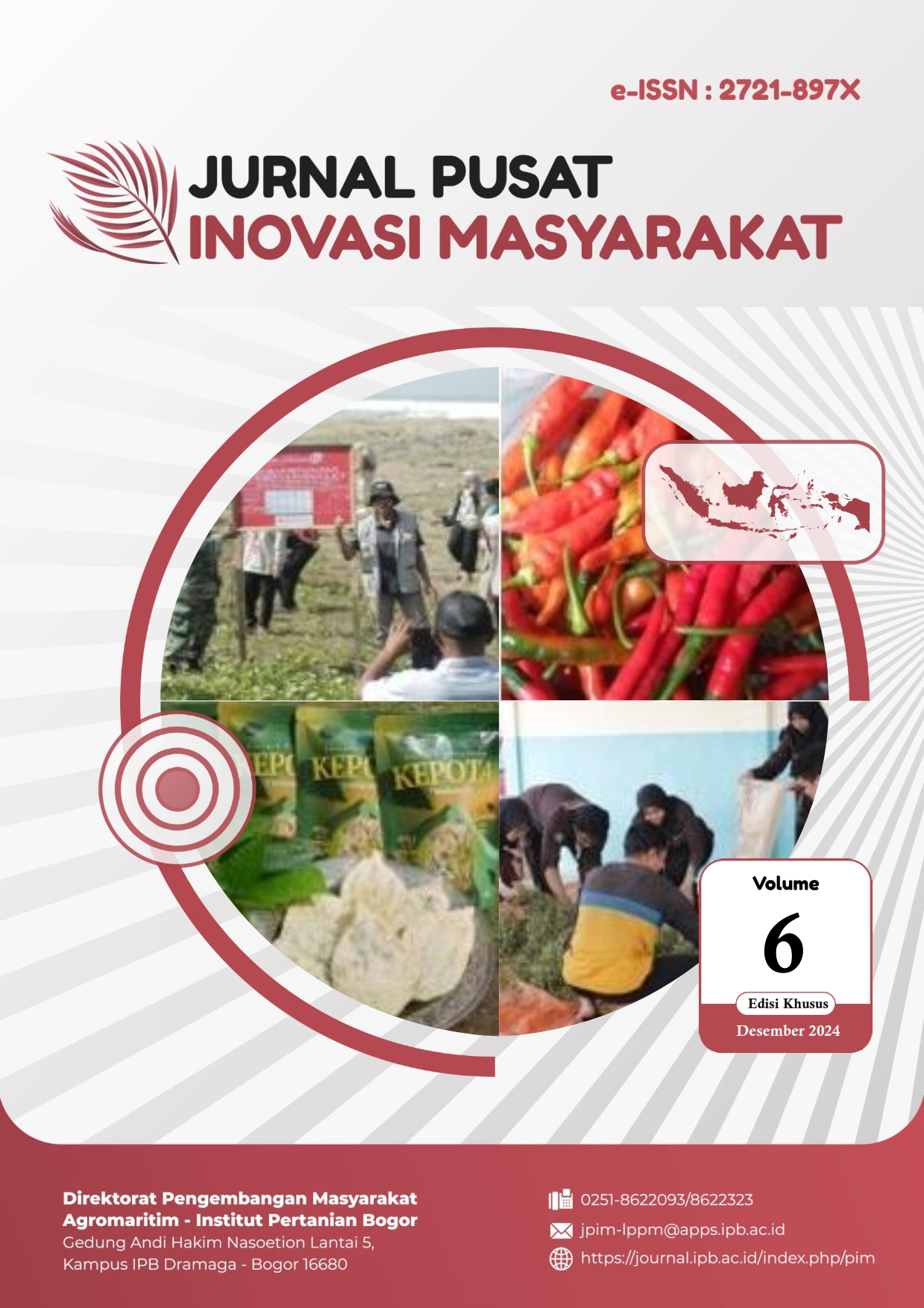Edukasi Tanaman melalui Program Green Harmony di Kelurahan Situgede, Jawa Barat
Abstract
The Green Harmony program, implemented by the Thematic Community Service (KKN-T) team from Institut Pertanian Bogor (IPB) in Situgede Village, West Java, aims to enhance community awareness and skills in environmental conservation through plant education. The program comprises three main sub-programs: Green Day, Kisah si Biji, and the Workshop Taman Rumah Ceria, all integrated with the Five Capitals Framework theory. The program's implementation involved collaboration with a local partner, Abdi Tani Farm, and educational outreach to elementary school students and the local community. Green Day focused on land reorganization, Kisah si Biji provided horticultural education to elementary school students, and the Workshop Taman Rumah Ceria offered practical training to residents on techniques for planting and caring for home garden plants. The program successfully engaged 53 children and 19 community members, improving environmental quality and strengthening community knowledge and practices in sustainable gardening. The education and empowerment provided through Green Harmony not only positively impacted the physical environment but also inspired the community to continue environmental stewardship and more effectively utilize their home gardens.
Downloads
References
Ardityana K, Kusumaningsih KR, Hadi DS. 2024. Pengaruh jarak tanam terhadap pertumbuhan tanaman jabon putih (Anthocephalus cadamba Miq.) di Kabupaten Temanggung, Provinsi Jawa Tengah. Jurnal Wana Tropika. 14(1): 1‒6. https://doi.org/10.55180/jwt.v14i1.1250
Baiah M, Fadiana M. 2024. Pendidikan karakter peduli lingkungan dengan penerapan budaya sekolah berwawasan lingkungan. Jurnal Basicedu. 8(3): 1700‒1710. https://doi.org/10.31004/basicedu.v8i3.7455
Cathrina TS, Rosadi NA, Nopiari IA. 2023. Pengaruh ukuran polybag terhadap pertumbuhan vegetatif sawi pakcoy (Brassica rapa L.). Jurnal Ganec Swara. 17(1): 1‒4. https://doi.org/10.35327/gara.v17i1.383
Kumar R, Tiwari A. 2020. Hands-on learning in plant sciences: A pedagogical approach for school children. International Journal of Educational Research. 101: 101‒108.
Maack M, Davidsdottir B. 2015. Five capital impact assessment: Appraisal framework based ontheory of sustainable well-being. Renewable and Sustainable Energy Reviews. 50(2): 1338‒1351. https://doi.org/10.1016/j.rser.2015.04.132
Noverita A, Darliana E, Darsih TK. 2022. Pendidikan Lingkungan Hidup Untuk Meningkatkan Ecoliteracy Siswa. Jurnal Sintaksis. 4(1): 52‒60.
Pribadi S. 2016. Kegiatan Workshop Dengan Metode Kolaboratif dan Konsultatif sebagai Upaya Meningkatkan Kemampuan Guru dalam Menetapkan KKM. Jurnal Ilmiah Mitra Swara Ganesha. 3(1): 16‒30.
Purnama BJ. 2022. Workshop Teknik Kelompok sebagai Strategi Efektif Meningkatkan Kompetensi Guru dalam Penyusunan Instrumen Penilaian. Jurnal Karya Ilmiah Guru. 7(3): 308‒316. https://doi.org/10.51169/ideguru.v7i3.445
Rodríguez LE, González JP, Hernández ML. 2020. Environmental consciousness through horticulture: An educational intervention. Environmental Education Research. 26(5): 637‒650.
Silva AL, Pereira TR, Moreira, SA. 2022. The role of horticulture in environmental sustainability education. Journal of Horticultural Science & Biotechnology. 97(2): 234‒241












